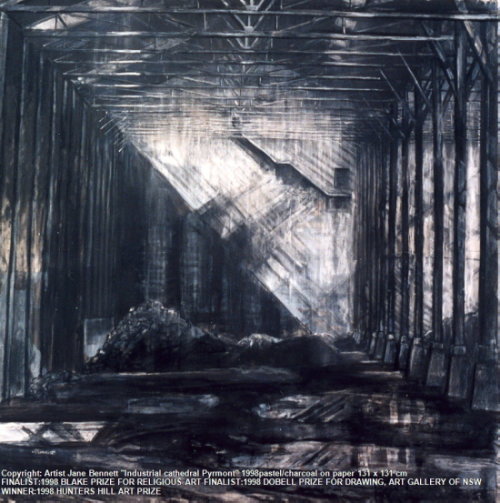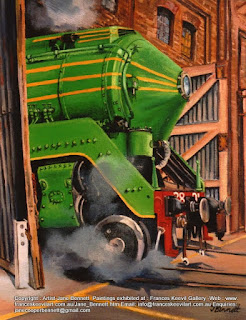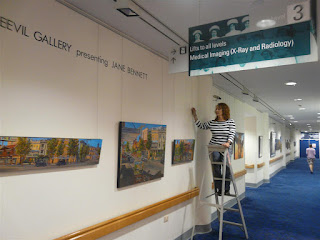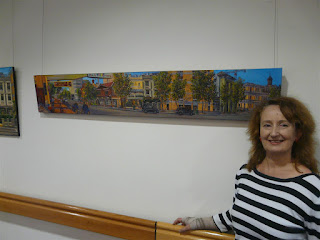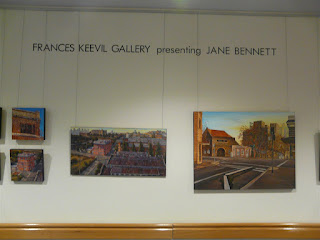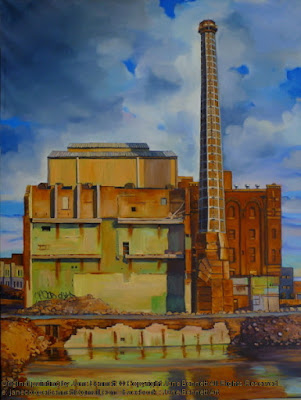On the ATP Open Day I had to be in 3 places at once.
I was to exhibit my paintings of Eveleigh in the Exhibition Hall and simultaneously paint while the blacksmiths of Wrought Artworks gave their forging demonstrations.
I would be displaying 38 paintings on 20 easels in the Exhibition Hall.This included 2 works on paper framed under glass, that were so large that they could only just be crammed into my station wagon. Some of the paintings were from my home in the north-western suburbs and some at the Frances Keevil Gallery in Double Bay.
In addition to this, I was exhibiting another 8 paintings of the blacksmiths in Bay 1/2, as well as some large half finished canvases. I also needed to bring my French box easel, palette and paint so that I could give the onlookers an insight into the process of painting from life.
The 20 easels required a separate journey, as I have learnt the hard way that trying to transport paintings and easels in the one trip always ends in tears. Unfortunately all of the deliveries and all the setting up of the exhibition had to be on Friday, the day before, so this resulted in 5 trips.
I was to exhibit my paintings of Eveleigh in the Exhibition Hall and simultaneously paint while the blacksmiths of Wrought Artworks gave their forging demonstrations.
I would be displaying 38 paintings on 20 easels in the Exhibition Hall.This included 2 works on paper framed under glass, that were so large that they could only just be crammed into my station wagon. Some of the paintings were from my home in the north-western suburbs and some at the Frances Keevil Gallery in Double Bay.
In addition to this, I was exhibiting another 8 paintings of the blacksmiths in Bay 1/2, as well as some large half finished canvases. I also needed to bring my French box easel, palette and paint so that I could give the onlookers an insight into the process of painting from life.
The 20 easels required a separate journey, as I have learnt the hard way that trying to transport paintings and easels in the one trip always ends in tears. Unfortunately all of the deliveries and all the setting up of the exhibition had to be on Friday, the day before, so this resulted in 5 trips.
 |
| With my team of helpers, Ron, Fay and Tony! |
On the Open Day I was helped by the directors of the Frances Keevil Gallery, Frances Keevil and Lynn Westacott, who both came along to look after the exhibition and stayed to pack up and deliver works back to the gallery.
I also received a great deal of help from a most unexpected source. A couple of weeks before, I had been invited to talk about my work at the inner-western Sydney branch of Rotary. Despite my total cluelessness about Powerpoint ( I managed to disconnect my laptop, but I fortunately had brought some canvases with me in case I messed up the technology), I must have done something right. Fay Thurlow, Ron Bottrill and Tony Bastow from Rotary all turned up, full of enthusiasm and energy.
I was so grateful for this as it freed me to be able to paint as well as exhibit my work.
I think the relief and gratitude showed in my face as I painted!
I also received a great deal of help from a most unexpected source. A couple of weeks before, I had been invited to talk about my work at the inner-western Sydney branch of Rotary. Despite my total cluelessness about Powerpoint ( I managed to disconnect my laptop, but I fortunately had brought some canvases with me in case I messed up the technology), I must have done something right. Fay Thurlow, Ron Bottrill and Tony Bastow from Rotary all turned up, full of enthusiasm and energy.
I was so grateful for this as it freed me to be able to paint as well as exhibit my work.
I think the relief and gratitude showed in my face as I painted!
 | ||
|
The blacksmith in the background is Chris Sulis, who is also the subject of the very large half finished canvas displayed next to me in the photo below.
 |
Art and life.
I'm starting a canvas of Chris hand forging, next to my giant canvas portrait of Chris forging chisels on the Massey steam hammer.
|
I quickly started the largest spare canvas that I had. As well as giving the onlookers something to see, it helps just to break the ice. It's important for me to start quickly - to get something on the canvas even if I later paint out every mark I make. If I sit there deliberating too long I can get paralysed with fear that I will make the wrong brushstroke and make a fool of myself in public. There is no time for fear or second thoughts on a day like this.
I have to make every moment count. I make cryptic scribbly marks in paint on a dozen small canvases at my feet, as I try to commit the nonchalant balletic grace of the blacksmiths to memory. They are swift and economical with their movements, as only men who are waving around large pieces of red hot metal in a confined space can be.
Their gestures sometimes bring to mind echoes of half forgotten classical poses from art history. The tense crouch of quenching a chisel in a trough is briefly transformed into the stance of a Roman about to spear a dying Gaul.
Although their movements are swift, once I pick up the rhythm and sequence of their routine I can isolate gestures that will make interesting paintings
The blacksmiths rarely fire their furnaces now. Most of their work involves welding rather than traditional blacksmithing techniques. This is as much a treat for them as it is for their audience.
There were 2 locations to paint on the Open Day. At the northern end of the Blacksmith's enclosure, Guido and Chris had lit a furnace for a more or less continuous demonstration of hand forging and hammering techniques. About every 2 hours they would open the gates to let people in for the spectacular steam hammer forging sessions. I would then carefully balance my brushes on my palette and scamper past the barriers just in time to set up. I spent all day running from one site to the other in a sort of mad artistic relay race.
I find painting in these circumstances exhilarating, as much sport as art.
I have to make every moment count. I make cryptic scribbly marks in paint on a dozen small canvases at my feet, as I try to commit the nonchalant balletic grace of the blacksmiths to memory. They are swift and economical with their movements, as only men who are waving around large pieces of red hot metal in a confined space can be.
Their gestures sometimes bring to mind echoes of half forgotten classical poses from art history. The tense crouch of quenching a chisel in a trough is briefly transformed into the stance of a Roman about to spear a dying Gaul.
Although their movements are swift, once I pick up the rhythm and sequence of their routine I can isolate gestures that will make interesting paintings
The blacksmiths rarely fire their furnaces now. Most of their work involves welding rather than traditional blacksmithing techniques. This is as much a treat for them as it is for their audience.
There were 2 locations to paint on the Open Day. At the northern end of the Blacksmith's enclosure, Guido and Chris had lit a furnace for a more or less continuous demonstration of hand forging and hammering techniques. About every 2 hours they would open the gates to let people in for the spectacular steam hammer forging sessions. I would then carefully balance my brushes on my palette and scamper past the barriers just in time to set up. I spent all day running from one site to the other in a sort of mad artistic relay race.
I find painting in these circumstances exhilarating, as much sport as art.
 |
This was painted during the first steam hammer forging demonstration.
I have just started a small canvas of the master blacksmith, Guido Gouvernor with Chris Sulis at the Massey steam hammer. Guido (wearing a festive pair of red earmuffs) is in the foreground.
Enquiries : janecooperbennett@gmail.com
|
 |
This shows the same canvas after the next forging demonstration. I have painted in the face and arms of Chris, who is holding the object being forged.
Enquiries : janecooperbennett@gmail.com
|
In the afternoon, I visited my exhibition in Bay 12, and was very impressed with the way that it had been arranged by my friends.
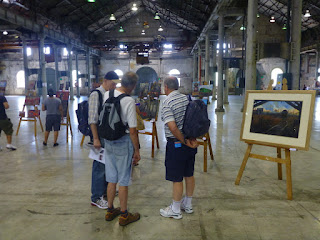 |
Some visitors in front of my painting of the
"BHP Goods Yard, Newcastle" 1998.
Enquiries : janecooperbennett@gmail.com
|
 |
A young train buff taking photos of my paintings of the lamp trikes of the Paint Shop of North Eveleigh.
Enquiries : janecooperbennett@gmail.com |
One of the features of the Open Day was the inaugural Eveleigh Film Festival.
The photo below shows two of the heroes of my favourite railway film "Darling Island Shunters".
Darling Island was ending its days a a working goods yard, just as I was starting to be serious about my project of painting Pyrmont.
I'm so glad that I had included a tiny little painting of the Darling Island Goods Yard which I had painted in the 1980s, and a book of photos of my other paintings of Pyrmont.
They also used to ride the ancient lamp trikes that I had painted in the canvases behind them.
 |
| "Darling Island Shunters" |
I have just read Julie's wonderful post about the Open Day Singing the body electric.The Walt Whitman poem chosen to accompany her photos has always been one of my favourite pieces of writing. It manages to put into words the feelings that I have when I paint far better than I ever could.
